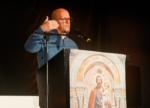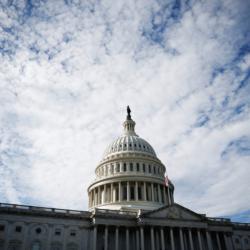Your fair share of taxes
"The wealthy should pay more of their fair share of taxes!" But how much more, and by what standard? The wealthiest tenth of Americans pay about 30 percent of their earnings in combined federal, state, property, excise and sales taxes. Would 32 percent all of sudden be fair? But if so, then why not 28 percent?
One might be secretly supposing that they should pay taxes until they have no more money than anyone else, which is envy, or sorrow at another's good. Like other sins, envy accomplishes nothing. Our problems cannot be solved by taking. Take away completely the combined net worth of Bill Gates and Warren Buffett ($100 billion), and you can run the government for just 10 more days (but probably fewer days in the long run, because those gentlemen will be unable to pay future taxes).
Or take away all the money of all the high-net worth individuals in the wealthiest cities in the U.S. and, with this one-time scheme, you can run the Federal government for only a year; and in doing so you would have taken away the earnings, too, of those who would have been employed through their spending of that money.
It is hard to find Catholic social teaching on taxes. You have to read between the lines of the Catechism's brief assertion that "Submission to authority and co-responsibility for the common good make it morally obligatory to pay taxes, to exercise the right to vote, and to defend one's country" (2240). On the surface, this tells us that it is not wrong to pay taxes, as some contemporaries of the apostles supposed, but rather an obligation.
But note the condition: taxes are for the common good. From which we may deduce an obligation that falls upon the government rather than the citizen; namely, that the government may take money through taxation for no purpose other than the common good.
In the old texts this principle used to be stated bracingly, as in Jesuit Father Edward Cahill's comprehensive treatise on "The Framework of a Christian State": "If, therefore, the rulers mismanage or devote any portion of these funds to purposes other than the common good, they are guilty not only of violating Legal Justice, but also of exacting money from private individuals on false pretenses, which is robbery or rapine, and they abuse a public trust in doing so which is embezzlement. Furthermore, if rulers impose taxes in excess of what is needed for the common good or beyond what the individual citizen is justly able to pay, they are likewise guilty of injustice and fraud."
In magisterial documents, we have to turn to the original encyclical on Catholic social teaching, "Rerum novarum," (1891) to find the best single statement on taxation. Pope Leo XIII is arguing against socialism and defending the principle of ownership, which goes back to Aristotle, which is that the common good is best served if citizens own property but put that property to use for the good of others. After explaining three benefits that come from such a scheme, he warns that those benefits "can be reckoned on only provided that a man's means be not drained and exhausted by excessive taxation. The right to possess private property is derived from nature, not from man; and the State has the right to control its use in the interests of the public good alone, but by no means to absorb it altogether. The State would therefore be unjust and cruel if under the name of taxation it were to deprive the private owner of more than is fair."
So even expenditures for the common good may be unjust, if they "drain and exhaust" wealth; if they are premised on the denial of the natural right to own the fruit of one's labor; or if the state "deprives" the private owner rather than assist and supplement, in the manner of subsidiarity.
Although there can be gray areas, one may also expect that there are lines which, when crossed, clearly signal excessive taxation. The peasants in Pharaoh's Egypt paid a rent of 30 percent. Historians tell us that serfs in medieval Europe paid the manor lord about 25 percent and maybe 10 percent more in tithes to the Church. These burdens do not look light to us now. The marginal tax rate in the U.S. is currently about 50 percent: that is, earn an extra dollar, and after combined taxes (including FICA collections), the worker gets to keep only half.
Someone might say that a reasonable guide to the justness of a tax system is whether it strikes a generous and fair people as just. But in order to discover this, make it so that they appreciate concretely what that system really is. Instead of automatic payroll deductions, require people to go to a tax office and pay their tax in cold cash--so that it becomes very clear what good things, such as education or home improvement, they are not spending this money on. Then, instead of treating their tax payments as all fungible, keep each individual's payment nominally in a "packet," and follow its use, so that each person can go to the internet and find out exactly how his "packet" of taxes was spent--just as for some relief agencies you can know the name of the child your donation helped.
People could then easily see whether the share they were paying was "fair."
Michael Pakaluk is professor and chairman of philosophy at Ave Maria University and the author (with Mark Cheffers) of "Accounting Ethics."



















